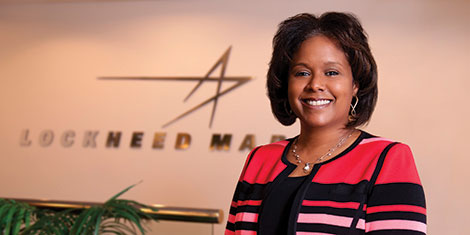When Stephanie Hill ’86, computer science and economics, signed up for her first computer programming class at UMBC, it was almost as an afterthought – an elective to fill out the semester.
That class in the programming language COBOL led Hill to become (in her words) an “accidental engineer.” And however serendipitous her start in engineering may have been, she’s been quite a success. At Lockheed Martin’s Information Systems & Global Solutions-Civil division, Hill oversees some of the largest government computer systems in operation today. She’s also been honored by the university as one of its 2012 Alumni of the Year.
At UMBC, Hill says she learned that she “loved the problem-solving aspect” of programming and software engineering. “You could make things happen. It took me to a new level of satisfaction, figuring out a problem and being able to see the answer,” Hill says. She also cites a three-year professional practice co-op that UMBC had set up with the Department of Labor during her time at the university as instrumental in setting the stage for her success.
The problems that Hill tackles now at Lockheed Martin involve immense complexity. Her division is responsible for the company’s work with U.S. civil federal agencies and other government agencies worldwide – tasks that demand the smooth operation of many large computer systems that Hill’s group oversees.
If you’ve been on an airplane, you likely have flown through airspace managed by an air traffic control system that Hill’s division at Lockheed Martin runs on behalf of the Federal Aviation Administration. Those who served in the armed forces may use a disability system Hill oversees for the Department of Veterans Affairs, and anyone who has drawn on the resources provided by Medicare or Medicaid also depends on the work in Hill’s division.
“We literally impact the lives of American citizens every day,” Hill says.
Soon after graduating from UMBC, Hill took a job with defense contractor Martin Marietta. The only open position was in software testing, but she let the company know she was eager to be in software engineering.
Hill proved her mettle and was promoted to software engineer within a few years. Ever since, she has tirelessly worked up through the ranks of the company (which in 1995 merged with Lockheed Corporation to become Lockheed Martin) in roles of increasing responsibility that included positions as the company’s Director of Quality and Mission Success and as its Director of Technical Operations.
As she has risen to greater prominence, Hill has also been visible as a leader in efforts to help more women and minorities follow her into careers in engineering.
As Hill pointed out in an op-ed she wrote for The Washington Post in May 2012, only 14 percent of engineers today are women, and only 6 percent of those working in the fields of science, technology, engineering, and mathematics (STEM) are black or Hispanic.
One problem in boosting those dismal numbers is that many women and minorities don’t see role models in their neighborhoods and schools – a reason why Hill has served as a mentor to many UMBC students.
“We have a real responsibility to share what we do,” she says. She is also a member of the state of Maryland’s STEM Task Force, which seeks ways to encourage more learning in the sciences.
“I never imagined I’d have the opportunities that I have had. I want other people to experience it,” Hill says. “Seeing people blossom and become leaders is very motivating and satisfying.”
Hill says one of the biggest misconceptions people have about engineering is that it is a job for introverts. In fact, she says, much of her time at Lockheed Martin is spent working with others – meeting employees for first-hand accounts of what’s happening in the field, or checking in with customers to make sure their expectations are met.
Pursuing a career in engineering doesn’t mean that “you are sitting behind the desk with your head down, not talking to anybody,” Hill says. “There is some of that individual work, but most of the work we do we do in a team. And we do some of the most exciting things any career could offer.”
– Joab Jackson ’90
Read more about Hill’s piece in the Washington Post here.
Tags: Summer 2013

